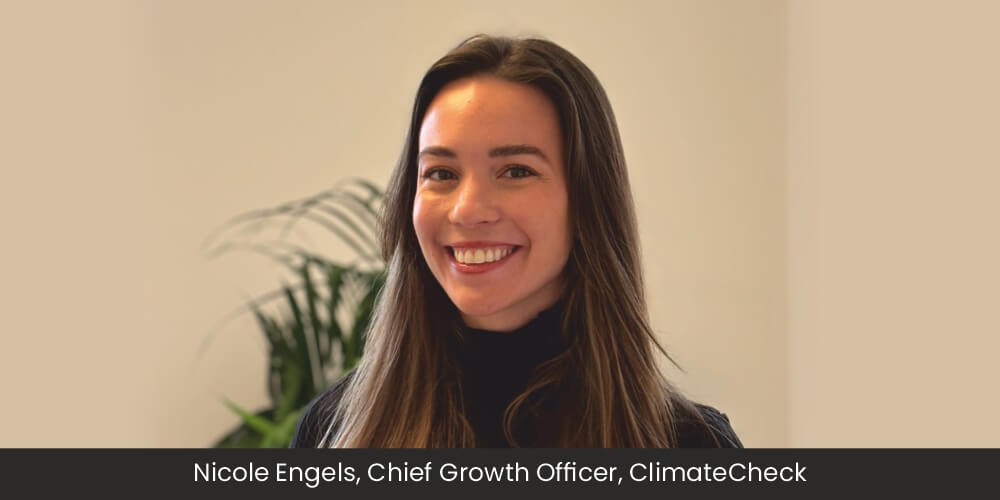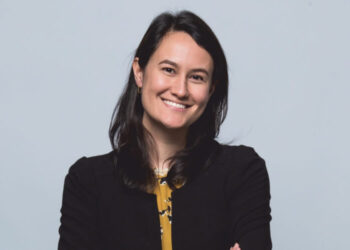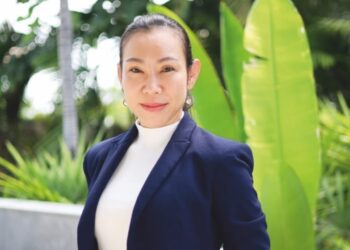Nicole Engels, the Chief Growth Officer at ClimateCheck, is a visionary leader with a proven track record in spearheading sustainability and climate initiatives across diverse industries such as insurance, agritech, and food and beverage. Her role involves collaborating with clients to optimize the use of ClimateCheck’s offerings, enabling them to make informed decisions that protect their assets and ensure robust long-term growth.
Nicole attributes her success and strategic acumen to her Columbia MBA education, which provided a solid foundation in core business principles, including strategy, finance, and operations. Her specialized focus on climate and entrepreneurship has been particularly valuable in comprehending the implications of climate challenges and devising effective solutions.
The Columbia MBA program’s emphasis on strategic thinking and problem-solving skills has empowered Nicole to identify opportunities and develop innovative approaches to tackle climate challenges. Drawing from her experience in brand management, she recognizes that a successful strategy is akin to a compelling story, where its logical soundness and inspirational nature define its success.
Nicole’s background in international relations has equipped her with a nuanced understanding of global policy frameworks, climate agreements, and environmental regulations. This knowledge has proven invaluable in aligning business strategies with regulatory requirements and leveraging policy support to drive sustainable initiatives. A concrete example of this application is seen in the active engagement with California’s new Senate Bill 216 on climate risk disclosure.
Below are highlights of the interview:
Could you share more about your career trajectory and what led you to your current role as Chief Growth Officer at ClimateCheck?
My background: I grew up in Sao Paulo, Brazil, and went to boarding school in the UK when I was only 16 years old. I then pursued my Bachelor and Master of Arts in International Relations at the University of Edinburgh in Scotland. I then worked for AB Inbev in London, VOA, an agritech startup in Brazil, before pursuing my MBA at Columbia Business School in New York, where I focused a lot of my time on climate risk innovation. I am now working for ClimateCheck, which is based in San Francisco. What led me to this position?
I come from a family of entrepreneurs in the agribusiness industry and have seen firsthand their struggles over the past 5+ years. Given the changes in climate, with an increase in droughts, floods, and wildfires, our yields have significantly declined, and the situation is projected to get worse.
After university, my focus was to get the best business education I could possibly get through work and further academia, and working at AB Inbev gave me that: structure, professionalism, and the importance of taking ownership of your work with many moving parts.
As a business development expert, what strategies have you found most effective in driving growth for ClimateCheck while addressing climate challenges?
Marketing and Branding: Develop a strong brand identity and marketing strategy to effectively communicate ClimateCheck’s value proposition. Utilize various B2B marketing channels, such as industry conferences, and optimising SEO and CRM.
Customer Feedback and Continuous Improvement: Actively seek feedback from customers to understand their needs and improve the products and services accordingly. This can help in building customer loyalty and attracting new customers through positive word-of-mouth.
International Expansion: Explore opportunities to expand ClimateCheck’s operations globally. Identify regions where climate challenges are significant and tailor the offerings to meet the specific needs of those markets. We expanded to Canada this year and are looking at Europe and Asia as next steps.
How does ClimateCheck integrate climate risk assessments and solutions into its services and offerings to benefit businesses and communities?
The increase in extreme weather events is having important consequences for insurers, real estate investors, and lenders. Insurance premiums are rising in states like Florida and California, and in many cases, insurers are pulling out of these risky areas, deeming certain commercial and residential buildings uninsurable. This, in turn, is shifting climate risk to real estate lenders and investors.
Moreover, regulation has been passed in Europe and Canada, requesting companies to disclose these physical climate risks, and it has recently arrived in the US too. The SEC has proposed climate risk disclosures, and California has recently passed a new Senate Bill 216 on climate risk. There are just the first indications of the potential threats to businesses that are being caused by climate change.
ClimateCheck enables businesses to manage and mitigate risks associated with increasing extreme weather events. We provide companies with portfolio-level analysis and property-level reports that help them make strategic and operational decisions on assets that they hold or provide loans for. We also provide many consulting companies, including some of the big four, with physical climate risk data, which they use to build their own derivative products and advise their clients on risk management and disclosures.
We are seeing a number of investors in both commercial and residential real estate who hold well-performing assets but are finding it difficult to sell because insurance companies are not insuring their assets anymore. It is important that businesses gain a deep understanding of the climate-related risks pertaining to their portfolios and build mitigation and diversification strategies to help them navigate this increasingly volatile environment.
Moreover, we provide property level reports for homeowners at no cost on our website as a way of helping communities that don’t otherwise have access to this level of information and who need to start making more informed climate-related decisions about where they purchase their homes.
What are your long-term goals and aspirations for ClimateCheck in terms of driving sustainable growth and contributing to climate action?
My long-term aspirations for ClimateCheck are to provide complete and reliable physical climate risk solutions to businesses worldwide. We achieved a lot, but there is still a long way to go. Businesses in the United States have just started dipping their toes in this space, and there is still a lot of opportunity to grow here at home. That said, global expansion and other product developments are high on our priority list, and we will keep innovating and expanding in line with our customer needs.
In your opinion, what role do businesses and organizations like ClimateCheck play in the broader effort to combat climate change and create a more sustainable future?
Our role is not to combat or reverse climate change; our role is to help businesses and communities adapt to the changing environment and make more informed decisions.





